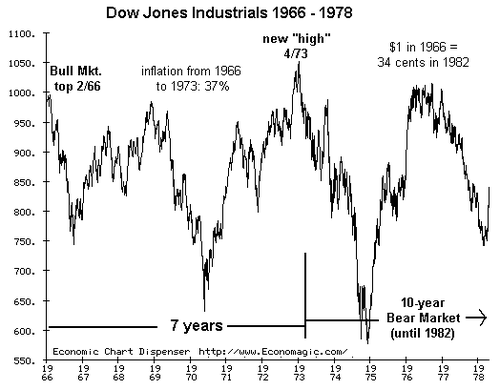Economics
We’ve Forgotten That Business-Cycle Recessions Are Essential
We’ve Forgotten That Business-Cycle Recessions Are Essential
Authored by Charles Hugh Smith via OfTwoMinds blog,
A stagnating zombie economy…

We’ve Forgotten That Business-Cycle Recessions Are Essential
Authored by Charles Hugh Smith via OfTwoMinds blog,
A stagnating zombie economy never recovers.
Four decades of rising markets punctuated by crisis-induced crashes seems to have fostered an unspoken belief that no one should ever get hurt in markets or the economy. Everything “should” always get better for everyone, without any messy loss or pain. Not only is this not realistic, it overlooks the role business-cycle recessions play in restoring the vibrancy of economies and markets distorted by excesses.
The global economy has been plagued by excessively easy financial conditions for 25 years, and so a vast array of marginal and superfluous activity was funded that would never have been funded in more prudent financial conditions. Too many marginal structures were built and too many marginal enterprises and ventures were funded.
As a result, we ended up with too many malls, too much retail space, too many office towers and too many empty houses and flats being kept off the long-term rental market so the investor/owners could feast on the riches of the short-term tourist rental market (AirBnB et al.), a market that is now starting to implode as cities ban or restrict these rentals.
Throw in marginal IPOs, SPACs and meme-stock manias, and we have a Mulligan Stew of excessive risk-taking. When money can be borrowed at near-zero rates, and “opportunities” for quick gains proliferate (FTX, etc.), excessive borrowing and speculation become “the smart thing to do.” In this mindset of raging “animal spirits,” only chumps hesitate to borrow big and chase some of the easy gains filling everyone’s pockets.
Everyone who staked capital or a livelihood in these marginal assets / enterprises will get hurt. Everyone who bought a bond that yields 1% as rates rise to 4% got hurt. Everyone counting on nearly free capital to flow forever will get hurt. Everyone chasing a speculative bubble higher will get hurt. Everyone counting on a greater fool to buy an overvalued asset will get hurt, as all credit-fueled asset bubbles pop and all credit-fueled business-cycle expansions roll over into contraction as marginal borrowers and lenders go bust and enterprises without profits or prospects of profits expire.
The forest fire analogy applies: the occasional lightning-strike ignited fire burns away the deadwood that’s collected, enabling new growth to obtain nutrients and sunlight. If authorities suppress these naturally occurring fires out of the mistaken belief that “all fires are bad,” the deadwood piles up and when a fire inevitably starts, it turns into a massive conflagration due to the excessive deadwood that piled up during the suppression of natural fires / recessions.
Another useful analogy is the Zombie Economy in which households, enterprises and entities that cannot survive without continual fresh injections of new borrowing are kept alive lest “somebody will get hurt” (usually gamblers and speculators, i.e. “shareholders.” After all, markets should be risk-free.).
As a result, debt-dependent Zombies proliferate, crowding out productive lending and investment. The Great Stagnation is the inevitable result of zombie banks being kept alive, zombie corporations being kept alive and zombie consumers being given more credit to enable more consumption.
In speculative frenzies fueled by easy money, the difference between prudent investments and high-risk gambles is obscured. Gains have been so steady that they appear guaranteed. Every new vacation rental flat is filled with guests paying top dollar, every meme stock soars to previously unimaginable heights, and so on.
Eventually the market is saturated, and there’s too much of everything: debt, risk, condo towers, strip malls, SPACs, IPOs, shared office spaces, etc.
Recessions are the process that clears the economy of deadwood that chokes off productive growth. Recessionary conflagrations are not fair or just. Previously well-managed companies make a bad bet that in good times gets absorbed but in recessions proves fatal. Previously prudent households lost their discipline and over-leveraged their income on risky bets that went bust. Governments assumed that the flood-tide of capital gains taxes would never ebb. And so on.
The greater the quantity of deadwood that has been allowed to pile up, the greater the intensity of the eventual recessionary conflagration. If systemic adaptation is also at work, one recession might not be enough. The 1970s offers one template for a decade of profound structural adaptations plus recurring business-cycle recessions plus a secular shift from low inflation to embedded inflation.
A stagnating zombie economy never recovers. More credit is dumped into marginal and superfluous entities on life support and so the deadwood piles up, stifling any productive growth. Eventually low productivity and massive debt burdens generate inflation (more credit-money is chasing fewer goods and services) and the resulting conflagration doesn’t just burn the deadwood, it burns down the entire forest–needlessly.
Rather than suppress recessions, we should embrace the discipline they impose as the essential dynamic of productive growth.
* * *
My new book is now available at a 10% discount ($8.95 ebook, $18 print): Self-Reliance in the 21st Century. Read the first chapter for free (PDF)
Tyler Durden
Tue, 03/21/2023 – 06:30
dollar
inflation
markets
bubble
stagnation

Argentina Is One of the Most Regulated Countries in the World
In the coming days and weeks, we can expect further, far‐reaching reform proposals that will go through the Argentine congress.
Crypto, Crude, & Crap Stocks Rally As Yield Curve Steepens, Rate-Cut Hopes Soar
Crypto, Crude, & Crap Stocks Rally As Yield Curve Steepens, Rate-Cut Hopes Soar
A weird week of macro data – strong jobless claims but…
Fed Pivot: A Blend of Confidence and Folly
Fed Pivot: Charting a New Course in Economic Strategy Dec 22, 2023 Introduction In the dynamic world of economics, the Federal Reserve, the central bank…
















